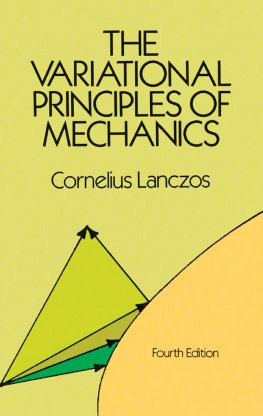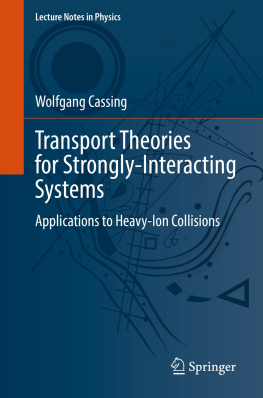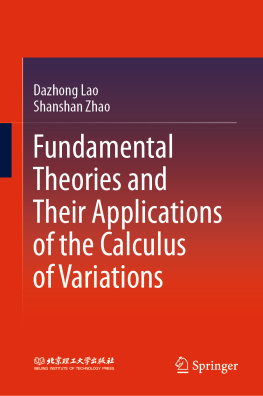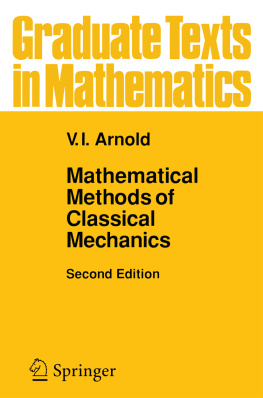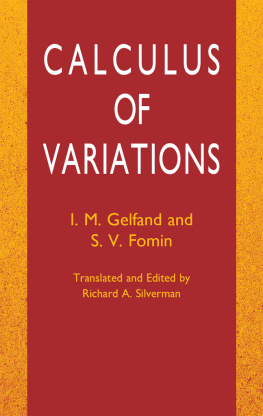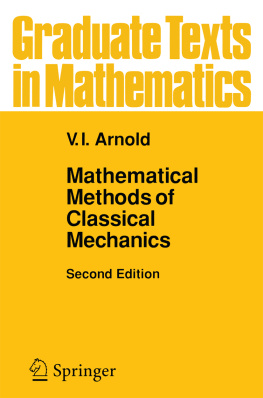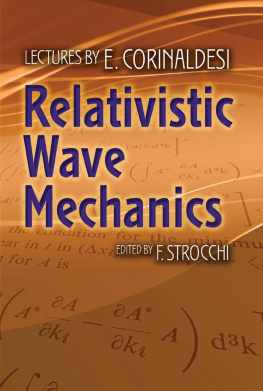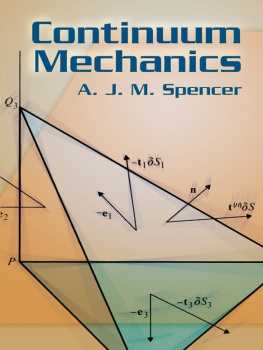THE VARIATIONAL
PRINCIPLES OF
MECHANICS
FOURTH EDITION
by
CORNELIUS LANCZOS
DOVER PUBLICATIONS, INC.
NEW YORK
Copyright 1949, 1962, 1966, 1970 by University of Toronto Press
All rights reserved.
Library of Congress Cataloging-in-Publication Data
Lanczos, Cornelius, 1893
The variational principles of mechanics.
Reprint. Originally published: Toronto : University of Toronto Press, c1970. (Mathematical expositions ; no. 4).
Bibliography: p.
Includes index.
1. Mechanics, Analytic. 2. Variational principles. I. Title. II. Series: Mathematical expositions ; no. 4.
QA805.L278 1986 531'.01'51 85-29168
eISBN-13: 978-0-486-13470-3
Manufactured in the United States by Courier Corporation
65067714
www.doverpublications.com
Was du ererbt von deinen Vtern hast,
Erwirb es, um es zu besitzen.
GOETHE
DEDICATED
TO
ALBERT EINSTEIN
PREFACE
F OR a number of years the author has conducted a two-semester lecture course on the variational principles of mechanics at the Graduate School of Purdue University. Again and again he experienced the extraordinary elation of mind which accompanies a preoccupation with the basic principles and methods of analytical mechanics. There is hardly any other branch of the mathematical sciences in which abstract mathematical speculation and concrete physical evidence go so beautifully together and complement each other so perfectly. It is no accident that the principles of mechanics had the greatest fascination for many of the outstanding figures of mathematics and physics. Nor is it an accident that the European universities of earlier days included a course in theoretical mechanics in the study plan of every prospective mathematician and physicist. Analytical mechanics is much more than an efficient tool for the solution of dynamical problems that we encounter in physics and engineering. However great may be the importance of the gyroscope as a practical instrument of navigation or engineering, it is not needed as an excuse to demonstrate the importance of theoretical mechanics. The very existence of the general principles of mechanics is their justification.
The present treatise on the variational principles of mechanics should not be regarded as competing with the standard textbooks on advanced mechanics. Without questioning the excellent quality of these primarily technical and formalistic treatments, the author feels that there is room for monographs which exhibit the fundamental skeletons of the exact sciences in an elementary and philosophically oriented fashion.
Many of the scientific treatises of today are formulated in a half-mystical language, as though to impress the reader with the uncomfortable feeling that he is in the permanent presence of a superman. The present book is conceived in a humble spirit and is written for humble people. The author knows from past experience that one outstanding weakness of our present system of college education is the custom of classing certain fundamental and apparently simple concepts as elementary, and of relegating them to an age-level at which the students mind is not mature enough to grasp their true meaning. The fruits of this error can be observed daily. The student who is thoroughly acquainted with the smallest details of an atom-smashing apparatus often has entirely confused ideas concerning the difference between mass and weight, or between heavy mass and inertial mass. In mechanics, which is a fundamental science, the confusion is particularly conspicuous.
To a philosophically trained mind, the difference between actual and virtual displacement appears entirely obvious and needs no further comment. But a student of today is anything but philosophically minded. To him the difference is not only not obvious, but he cannot grasp the meaning of a virtual displacement without experimenting with the concept for a long time by applying it to a variety of familiar situations. Hence, the author could think of no better introduction to the application of the calculus of variations than letting the student deduce a number of familiar results of vectorial mechanics from the principle of virtual work. As a by-product of these exercises, the student notices how previously unconnected and more or less axiomatically stated properties of forces and moments all follow from one single, all-embracing principle. His interest is now aroused and he would like to go beyond the realm of statics. Here dAlemberts principle comes to his aid, showing him how the same method of virtual displacements can serve to obtain the equations of motion of an arbitrarily complicated dynamical problem.
The author is well aware that he could have shortened his exposition considerably, had he started directly with the Lagran- gian equations of motion and then proceeded to Hamiltons theory. This procedure would have been justified had the purpose of this book been primarily to familiarize the student with a certain formalism and technique in writing down the differential equations which govern a given dynamical problem, together with certain recipes which he might apply in order to solve them. But this is exactly what the author did not want to do. There is a tremendous treasure of philosophical meaning behind the great theories of Euler and Lagrange, and of Hamilton and Jacobi, which is completely smothered in a purely formalistic treatment, although it cannot fail to be a source of the greatest intellectual enjoyment to every mathematically-minded person. To give the student a chance to discover for himself the hidden beauty of these theories was one of the foremost intentions of the author. For this purpose he had to lead the reader through the entire historical development, starting from the very beginning, and felt compelled to include problems which familiarize the student with the new concepts. These problems, of a simple character, were chosen in order to exhibit the general principles involved.
As regards content, an important topic not included in the present book is the perturbation theory of the dynamical equations. Also, an originally planned chapter on Relativistic Mechanics had to be omitted, owing to limitations of space. Yet even the material as it stands can well form the subject matter of a two-semester graduate course of three hours weekly, and it may suffice for a student of mathematics or physics or engineering who does not intend to specialize in mechanics, but wants to get a thorough grasp of the underlying principles.
The author apologizes for not giving many specific references. This material has grown with him for many years and consequently he is often unable to tell where he got his information. He is primarily indebted to Whittakers Analytical Dynamics, Nordheims article in the Handbuch der Physik, and Pranges article in the Encyklopaedie der mathematischen Wissenschaften all of which are mentioned in the Bibliography and recommended for advanced reading.
The author is deeply indebted to Professor J. L. Synge for the painstaking care with which he reviewed the manuscript and pointed out many weak points in the authors presentation. In some instances a divergence of viewpoints was apparent, but in others an improved formulation could be given, thus enhancing substantially the readability of the book. The author is also indebted to Professor G. de B. Robinson and Professor A. F. C. Stevenson who revised the entire manuscript, Mrs. Ida Rhodes of the Mathematical Tables Project, New York City, and Mr. G. F. D. Duff of the University of Toronto, who helped read the proof and prepare the Index. The generous co-operation of all these friends and colleagues has been a heart-warming experience.

